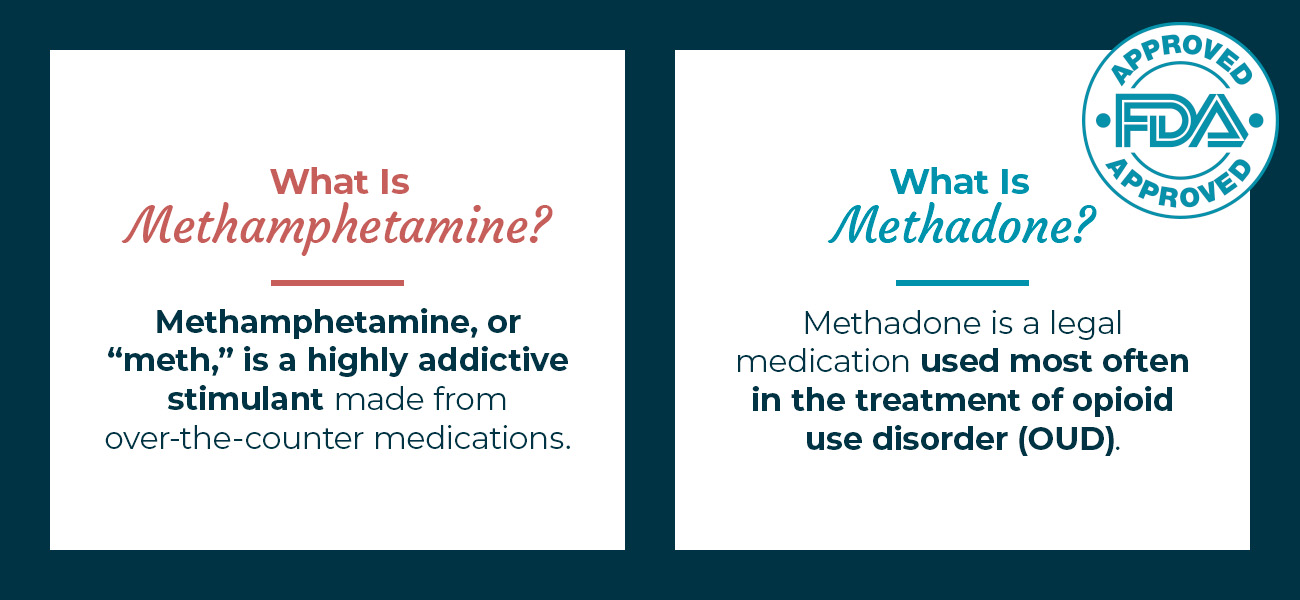Methadone and methamphetamine sound similar, but these drugs differ in how they help or harm. Methadone offers relief from withdrawal and cravings for those battling opioid addiction. Methamphetamine is an addictive stimulant with often devastating health risks.
Understanding the differences between these substances is vital for those facing addiction. Let’s take a detailed look at methadone vs. methamphetamine.
Are Methadone and Meth the Same?
The simple answer is no. “Meth” is the abbreviation for methamphetamine, a drug with high addiction risk. Methadone is a medication often used in the treatment of substance abuse.
Methadone and Methamphetamine Similarities
Methamphetamine and methadone share some characteristics:
- Classification: The United States Food and Drug Administration (FDA) classifies both drugs as Schedule II substances, meaning they carry a high potential for extreme psychological or physical dependence.
- Chemical structure: Meth and methadone are synthetic, which means they are man-made rather than natural.
- Drug target area: Both drugs affect the central nervous system, but they do so in different ways.
- Abuse potential: Although meth is far more addictive, methadone also carries the risk of misuse.
- Withdrawal symptoms: Stopping either substance can lead to physical and psychological withdrawal.
Methadone and Methamphetamine Differences
Despite their similarities, meth and methadone have key differences:
- Drug type: Meth is a type of amphetamine. Methadone falls into the category of opioid analgesics.
- Mechanism: The effects of meth come from the release of dopamine and norepinephrine in the brain. Methadone binds to mu-opioid receptors in the brain to alter pain perception.
- Effects: Methadone lacks the physical “rush” of other opioids. Meth causes feelings of energy and well-being combined with physical effects like rapid breathing.
- Addiction and withdrawal: While both carry the risk of abuse, meth is far more addictive. Methadone withdrawal symptoms are less intense than short-acting drugs.
- Regulation and law: Except in controlled circumstances, meth production and distribution are illegal. Licensed providers dispense legal methadone under strict regulations.
What Is Methamphetamine?
Methamphetamine, or “meth,” is a highly addictive stimulant made from over-the-counter medications. In 2022, over 2.7 million people in the U.S. used meth in the past 12 months.
Meth Ingredients
Meth’s most common primary ingredient is pseudoephedrine. Many cold and sinus medications contain this decongestant. Manufacturers may add other substances like baking soda or opioids like fentanyl.
One of the dangers of meth is not knowing what’s inside it.
Meth Uses
Meth comes in four different forms:
- Powder: The powdered form of meth is often snorted. Users may also swallow or dissolve the powder in liquid and inject it.
- Crystal: This is the strongest form of the drug, usually injected or smoked.
- Liquid: Dealers may dissolve the powder in water to transport it.
- Pill: Illegal recreational meth pills contain other substances, like caffeine.
The length and intensity of the drug’s effects depend on how it gets into the body.
Meth Effects
By releasing chemicals in the brain, meth causes physical and psychological effects, like:
- A feeling of euphoria
- Rapid breathing
- Decreased appetite
- Anxiety and paranoia
- Overheating (hyperthermia)
- Increased energy and talkativeness
- Heart palpitations or irregular heartbeat
Meth Health Risks
Using meth can have devastating short- and long-term health risks:
- Short-term: Meth use can cause a fatal overdose. High doses can lead to heart attack, stroke or organ problems.
- Long-term: Meth is highly addictive. Prolonged use can alter the brain, increasing anxiety, depression and psychosis risk. Users experience drastic weight loss, skin sores and irreversible brain damage. In addition, meth use can cause severe dental issues such as tooth decay and loss, known as “meth mouth.”
Meth use has a history of high death rates, with mortality rates in the U.S. quadrupling between 2013 and 2019.
Is Meth Legal?
In limited cases, forms of methamphetamine are legal. FDA-approved Desoxyn® is a prescription central nervous system stimulant. Doctors may prescribe Desoxyn for the treatment of attention deficit hyperactivity disorder (ADHD).
Outside of approved medical use, meth is illegal. The Drug Enforcement Administration (DEA) enforces strict laws around the manufacture, sale and possession of the drug. The Combat Methamphetamine Epidemic Act of 2005 banned over-the-counter medications containing pseudoephedrine.

What Is Methadone?
Methadone is a legal medication used most often in the treatment of opioid use disorder (OUD). It is one of three OUD treatments approved by the FDA.
The Substance Abuse and Mental Health Services Administration (SAMHSA) controls dispensing of methadone.
Methadone Ingredients
Methadone is both the name of the drug and its active ingredient.
U.S. methadone brands include Dolophine, Methadose, Diskets Dispersible and Methadone HCI Intensol.
Methadone Uses
Methadone’s main function is pain management. It works by altering receptors in the brain to block pain.
Uses of methadone include:
- OUD treatment: Methadone detoxifies the body of substances and reduces withdrawal.
- Moderate-to-severe pain management: Doctors prescribe methadone for cancer, chronic pain or terminal illness.
- Neonatal abstinence syndrome (NAS): Substance abuse during pregnancy can affect the fetus. Although not FDA-approved, methadone may provide supportive treatment for NAS.
Methadone Health Risks
Overuse of methadone increases the risk of addiction. The body becomes dependent on the drug, and stopping can have unpleasant effects. Clients under a methadone treatment program taper off gradually to decrease withdrawal intensity.
Like many medications, methadone has possible short- and long-term side effects:
- Short-term: You may experience headaches, restlessness, nausea, mood changes and weight gain.
- Long-term: Used under medical supervision, SAMHSA considers methadone safe for long-term use. However, possible effects include respiratory, gastrointestinal and cardiovascular issues. Frequent use can lead to addiction, which may require methadone detox treatment.
Methadone treatment requires an OUD diagnosis and must take place under medical care.
The Benefits of Methadone Addiction Treatment
Addiction recovery is a physically and psychologically challenging process. Here are some of the reasons why methadone is a helpful tool in addiction treatment:
- Reduces drug cravings: Methadone acts on the brain’s opioid receptors to prevent cravings.
- Decreases withdrawal symptoms: Common withdrawal symptoms include vomiting, diarrhea, anxiety and body aches. Methadone helps to avoid these symptoms.
- Dulls opioid effects: Methadone lessens the rush experienced when using drugs like heroin.
- Prevents relapse: The absence of cravings or withdrawal makes relapse less likely.
- Increases quality of life: Addiction can be all-consuming. Freeing yourself from its grip leaves you open to enjoy life.
- Improves recovery chances: Methadone maintenance treatment (MMT) offers detoxification and withdrawal management. Medical professionals perform the plan to ensure safety. The chances of successful recovery increase when using an MMT.
Why Trust Us for Help With Addiction Recovery?
At Diamond House Detox, we seek to address the underlying cause of addiction. We’ve assembled a team of professionals who specialize in substance abuse treatment.
We have extensive experience with methamphetamine and methadone addiction. Our holistic approach includes detoxification programs and in-house incidental medical services. Treating addiction means resolving underlying mental illnesses in a safe, welcoming environment.
Trust Diamond House Detox to Support Your Addiction Recovery Journey
The first step toward addiction recovery is often the hardest. Diamond House Detox is here to make the journey easier. We know it takes courage to enter rehab, so we’ve created a warm and welcoming environment.
If you or a loved one is facing meth or methadone addiction, we can help. Our tailored treatment plans address all aspects of addiction. We offer methamphetamine detoxification with therapy and medical treatment.
Learn more about our outpatient and inpatient stabilization services in Northern California and Sacramento. Call us at 888-205-9455 or contact us online today.






